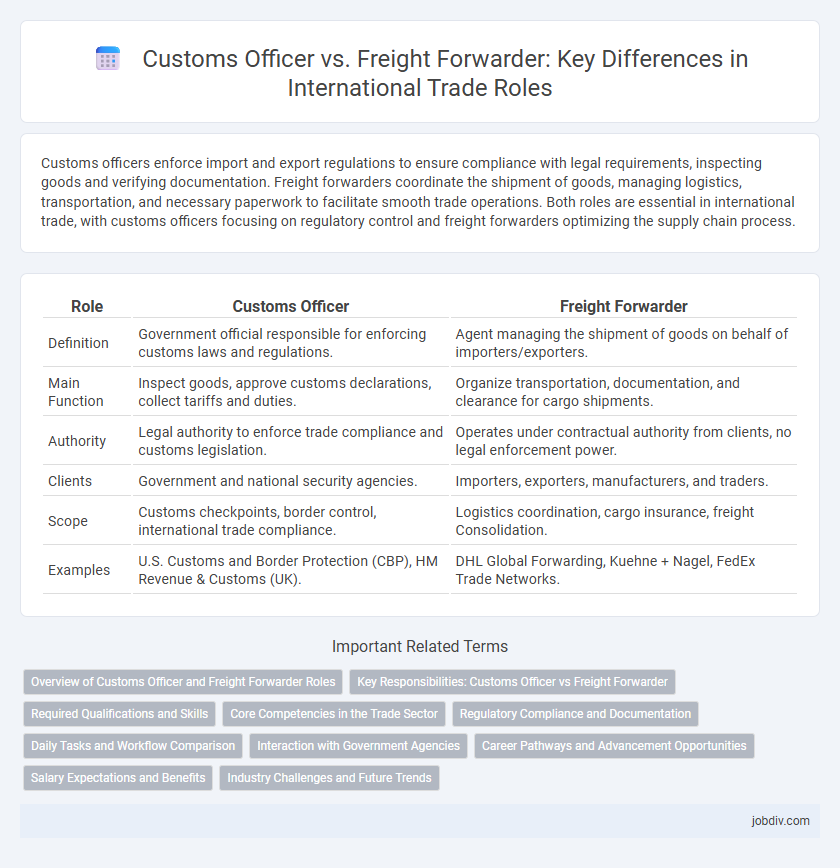Customs officers enforce import and export regulations to ensure compliance with legal requirements, inspecting goods and verifying documentation. Freight forwarders coordinate the shipment of goods, managing logistics, transportation, and necessary paperwork to facilitate smooth trade operations. Both roles are essential in international trade, with customs officers focusing on regulatory control and freight forwarders optimizing the supply chain process.
Table of Comparison
| Role | Customs Officer | Freight Forwarder |
|---|---|---|
| Definition | Government official responsible for enforcing customs laws and regulations. | Agent managing the shipment of goods on behalf of importers/exporters. |
| Main Function | Inspect goods, approve customs declarations, collect tariffs and duties. | Organize transportation, documentation, and clearance for cargo shipments. |
| Authority | Legal authority to enforce trade compliance and customs legislation. | Operates under contractual authority from clients, no legal enforcement power. |
| Clients | Government and national security agencies. | Importers, exporters, manufacturers, and traders. |
| Scope | Customs checkpoints, border control, international trade compliance. | Logistics coordination, cargo insurance, freight Consolidation. |
| Examples | U.S. Customs and Border Protection (CBP), HM Revenue & Customs (UK). | DHL Global Forwarding, Kuehne + Nagel, FedEx Trade Networks. |
Overview of Customs Officer and Freight Forwarder Roles
Customs officers ensure compliance with import and export regulations by inspecting goods, verifying documentation, and enforcing tariffs and trade laws to prevent illegal activities. Freight forwarders coordinate the logistics of shipping, managing transportation, documentation, and storage to facilitate efficient movement of goods across borders. Both roles are crucial in international trade, with customs officers focusing on regulatory control and freight forwarders driving the operational flow of shipments.
Key Responsibilities: Customs Officer vs Freight Forwarder
Customs officers are responsible for inspecting and clearing goods at borders, ensuring compliance with import-export regulations, and collecting tariffs and duties. Freight forwarders organize the logistics of shipping, handling documentation, and coordinating transportation between suppliers, carriers, and clients. Both roles are essential in international trade, with customs officers enforcing legal requirements and freight forwarders managing the movement of goods efficiently.
Required Qualifications and Skills
Customs officers require in-depth knowledge of import-export regulations, customs laws, and security protocols, alongside skills in risk assessment and document verification to ensure compliance. Freight forwarders need expertise in supply chain management, logistics coordination, and carrier negotiations, supported by proficiency in transportation modes, international trade regulations, and customer service. Both roles demand strong analytical abilities, attention to detail, and effective communication, but customs officers emphasize regulatory enforcement while freight forwarders focus on optimizing shipment efficiency.
Core Competencies in the Trade Sector
Customs officers specialize in regulatory compliance, ensuring all imports and exports meet legal requirements, tariffs, and trade policies to prevent illegal trade activities. Freight forwarders excel in logistics management, coordinating transportation, warehousing, and distribution to optimize supply chain efficiency and cost-effectiveness. Both roles require knowledge of international trade regulations, but customs officers focus on enforcement and documentation accuracy, while freight forwarders emphasize operational planning and shipment execution.
Regulatory Compliance and Documentation
Customs officers enforce regulatory compliance by inspecting shipments and verifying that all import and export documentation meets government standards to prevent illegal trade activities. Freight forwarders manage and prepare the necessary shipping documents, such as bills of lading, commercial invoices, and customs declarations, ensuring timely and accurate submission to customs authorities. Their collaboration is crucial for smooth customs clearance, minimizing delays and avoiding penalties associated with regulatory violations in international trade.
Daily Tasks and Workflow Comparison
Customs officers primarily focus on inspecting and verifying shipments to ensure compliance with import-export regulations, reviewing documentation, and enforcing tariff and duty payments. Freight forwarders coordinate the logistics of shipping goods, arranging transportation, managing inventory, and preparing customs paperwork to facilitate smooth delivery. Both roles require meticulous attention to detail and regulatory knowledge, but customs officers emphasize law enforcement while freight forwarders specialize in supply chain management and cargo movement.
Interaction with Government Agencies
Customs officers enforce import and export regulations by inspecting shipments and ensuring compliance with government laws, directly interacting with border control agencies. Freight forwarders act as intermediaries, coordinating documentation and liaising with customs authorities to facilitate the smooth clearance of goods. Efficient collaboration between customs officers and freight forwarders is essential for streamlined trade operations and reduced clearance times.
Career Pathways and Advancement Opportunities
Customs Officers often begin their careers with government agencies, focusing on border security and regulatory compliance, with advancement opportunities into senior inspection or management roles within customs administration. Freight Forwarders typically start in logistics coordination or operations, progressing toward roles such as supply chain manager or international trade compliance specialist, leveraging their expertise in transportation and shipment optimization. Career growth for both paths depends on specialized knowledge, certifications like CBP (Customs Broker License) for Customs Officers, or CFF (Certified Freight Forwarder) credentials, and experience in trade regulations and global logistics.
Salary Expectations and Benefits
Customs officers typically earn a median salary of $54,000 to $75,000 annually, with benefits including government pensions, healthcare, and job security. Freight forwarders often have a broader salary range from $40,000 to $85,000, influenced by commission structures and bonuses tied to shipping volumes. Benefits for freight forwarders usually include performance incentives, flexible work schedules, and opportunities for international travel and career advancement.
Industry Challenges and Future Trends
Customs officers face increasing challenges in managing regulatory compliance amid evolving trade policies and heightened security measures, while freight forwarders grapple with optimizing supply chain efficiency and integrating advanced logistics technologies. The industry trends highlight a growing reliance on automation, AI-driven risk assessment, and blockchain for transparent documentation, transforming traditional roles and workflows. Collaboration between customs authorities and freight forwarders is becoming crucial to streamline border processes and support global trade resilience.
Customs Officer vs Freight Forwarder Infographic

 jobdiv.com
jobdiv.com